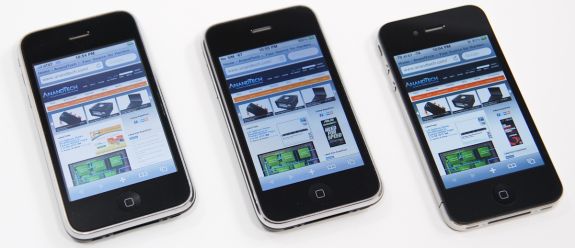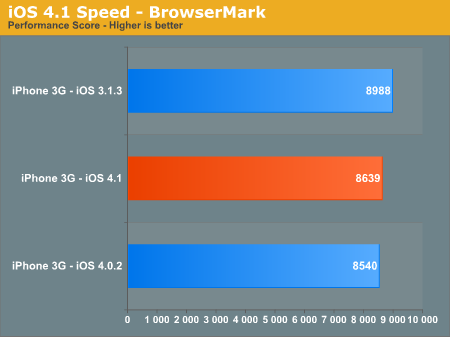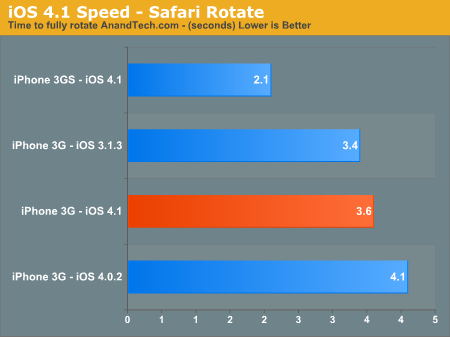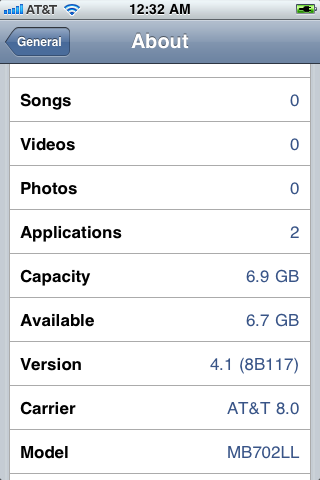Caring for the Elderly: iOS 4.1 Speed Boost on the iPhone 3G
by Brian Klug on September 7, 2010 1:20 PM EST- Posted in
- Smartphones
- iOS 4
- iPhone 3G
- Mobile
Introduction
Before I dive into the numbers, let’s talk briefly about what makes the iPhone 3G (and 2G) fundamentally different from the 3GS. The iPhone 3G, like the 2G, is based around a 412 MHz ARM11 family Samsung SoC which implements the ARMv6 instruction set. It’s got 128 MB of LPDDR1. By contrast, the iPhone 3GS uses a 600 MHz ARM Cortex-A8 family SoC which runs the ARMv7 instruction set, and packs 256 MB of LPDDR1. The iPhone 4 similarly runs ARMv7 code.
By nature of the two platforms running different instruction sets, their underlying iOS kernels are completely different, even though ARMv6 is a subset of ARMv7. In all likelihood, Apple embraces ARMv7 for speed gains on 3GS and 4, and therefore has to keep a separate kernel for ARMv6. That applied with iOS 3.x and applies the same way with iOS 4.x.
For whatever reason, it seems as though the kernel for ARMv6 devices like the iPhone 3G weren’t quite as optimized as they could have been. As a result, performance on iOS 4 with the iPhone 3G was sluggish.
Speed Testing the Platforms
Even while waiting in line for the iPhone 4, numerous iPhone 3G users I talked with noted a dramatic slowdown. Using one, I was amazed how sluggish things like even jumping in and out of the messaging application were. At the time, I wasn’t sure how much of this to attribute to the iPhone 3G just being an older device, or the iOS 4.0 update.
iPhone 3G users aren’t asking much, they just want the original speed and responsiveness of their devices back. For these tests, I borrowed a friend’s iPhone 3G and ran through a gamut of tests on iOS 3.1.3, iOS 4.0.2, and the iOS 4.1 GM which should be released September 8th. I also ran tests on an iPhone 3GS running 4.1 GM, though I’ve excluded results in two tables because the numbers destroy the dynamic range on the graphs for seeing change on the iPhone 3G.

iPhone 3G, iPhone 3GS, iPhone 4
Note that downgrading the iPhone 3G is easy since Apple isn’t enforcing SHSH blobs on it. If you can grab the image from any number of thoughtful repositories online, you can restore and downgrade with it. You might get stuck inside recovery mode at the end - but for that, simply use RecBoot.
Browser Testing
For all of these tests, I used a completely fresh, brand new restoration image with no other installed applications and connected to my 802.11n wireless network. I run tests three times and average, throwing out any outliers. Note that launching from a fresh install is critical on iOS as the platform saves a screenshot when closing, and immediately open that when relaunching so successive launches feel faster.
Our first test is the SunSpider JavaScript benchmark:

Unsurprisingly, the iPhone 3G on 4.0.2 and 4.1 beats 3.1.2. I say unsurprising because iOS 4.x brings a new version of WebKit with faster JavaScript engine. This is actually the one place where the 4.0.2 update helped the iPhone 3G. Note that the iPhone 3GS runs this test nearly 3x faster, taking 14707.8 ms.
Next up is Browsermark, which spits out an overall score representative of overall browsing responsiveness. There’s some JavaScript, some parsing, some rendering - it aims to be an all around general speed benchmark.

This is more along the lines of what people have been reporting with the iPhone 3G, though it isn’t quite as pronounced. iOS 3.1.2 scores higher than 4.0.2, but 4.1 closes the gap some. It still isn’t quite there, but has improved.
A similar test is to see how fast Safari rotates from landscape to portrait. On iOS 4.0.2, it’s measurably slower than 3.1.3, but how does 4.1 fare? Here we start the clock right as we rotate, and stop as soon as the page has rendered completely - you can tell when the text goes from fuzzy to sharp when Safari has completely rendered the page in the new orientation.

Here iOS 4.1 gets us close to how snappy 3.1.2 was but remains just a tad slower.











36 Comments
View All Comments
Colin1497 - Thursday, September 9, 2010 - link
Actually, it should have been more thoroughly tested, IMO. When I first installed 4.0, like the author for the tests, it was OK. It was several days before I started getting things like not being able to answer calls because the slider wouldn't respond in time. I disabled spotlight search (http://lifehacker.com/5599406/disable-spotlight-se... and that helped, but still it would become unresponsive and I'd do a hard reset and it would be OK for a while. This article was just a sign that the author has no understanding of what the issues were, and his conclusion is, frankly, insulting.watzupken - Thursday, September 9, 2010 - link
Seriously, I think with the current push for the 2 major mobile OSes, apart from the BB OS, we are in the position of a computer user, or may be worst. Right now, we are looking at mobile OSes that releases a new version every 6 to 12 mths. With every new release, the older hardware will suffer cause the new functions basically kills performance. Unlike a com, we do not have the chance to upgrade any part of the phone hardware to keep up with the requirement of the OS. Plus, we are all tied to a contract with the telco, thus, not all can afford to keep up to date on the hardware. Anyway, back to this review. I have not tested this on my last gen iPod Touch. May give it a try. On the iPhone 4, it is a great update, especially the HDR cam feature.Colin1497 - Thursday, September 9, 2010 - link
This article was a total failure. The author demonstrated that he has no understanding of the issue. The issue wasn't so much how fast a web page got rendered or how long it NORMALLY took to get things to happen. Those were slower, and if that was the only problem, saying "well, it is an older device" might have been an answer. The issue was that the phone would just become completely unresponsive for 5, 10 15 seconds. Sometimes you couldn't answer it when it was ringing. The slider would appear but you couldn't get it to answer.I suspect that the real issue is fixed, even if this article doesn't address it all and just makes the author look like a jerk (Seriously, you were a fan of Windows CE phones? LOL, what a maroon! What an ingoranimus! See, we can all be jerks.). Before you correct my spelling: http://www.youtube.com/watch?v=C_Kh7nLplWo
What the article does reveal is that 4.1 is better than 4.0. I'd wager that if Apple HADN'T screwed up the 3G version of iOS 4 so badly, the 3G users probably wouldn't have gotten these improvements. So, 2 months of "I HATE MY PHONE" traded for more longevity for the device.
monomer - Thursday, September 9, 2010 - link
Is there any chance we'll be able to get a battery life comparison of iOS 4.1 vs 4.0.x and 3.x on the 3G? It may be my imagination, but it seems like my battery life had decreased with iOS4, though it may be just a change in my usage.Shaorinor - Sunday, September 12, 2010 - link
I jailbroke a friend's 3G and the problem is that too many apps seem to hang in memory after you close them. A side effect of the "multi-tasking" enhancement to the new OS I would say. Once I killed all the loose processes from all the apps that I opened, the phone sped up significantly again.Luckily, I was able to downgrade him back to firmward 3.1.3. I'd personally advise holding off upgrading to any firmware until you see all the major kinks have been worked out.
jeans_xp - Wednesday, October 20, 2010 - link
A4 is manufactured by SAMSUNG semiconductor. For more information: www.mobilegoing.com